Exploring Intercultural Competence Through Cultural Autobiography
VerifiedAdded on 2023/06/10
|11
|2515
|354
Essay
AI Summary
This essay presents a cultural autobiography exploring intercultural competence. It includes a questionnaire and its impact on the author's life, along with responses from colleagues of different backgrounds. Similarities and differences between these biographies are identified and evaluated using Hofstede's cultural dimensions theory. The essay concludes that cultural diversity is crucial for business growth, and intercultural competence is essential for employees to perform effectively. Desklib offers a platform to explore similar solved assignments and resources for students.
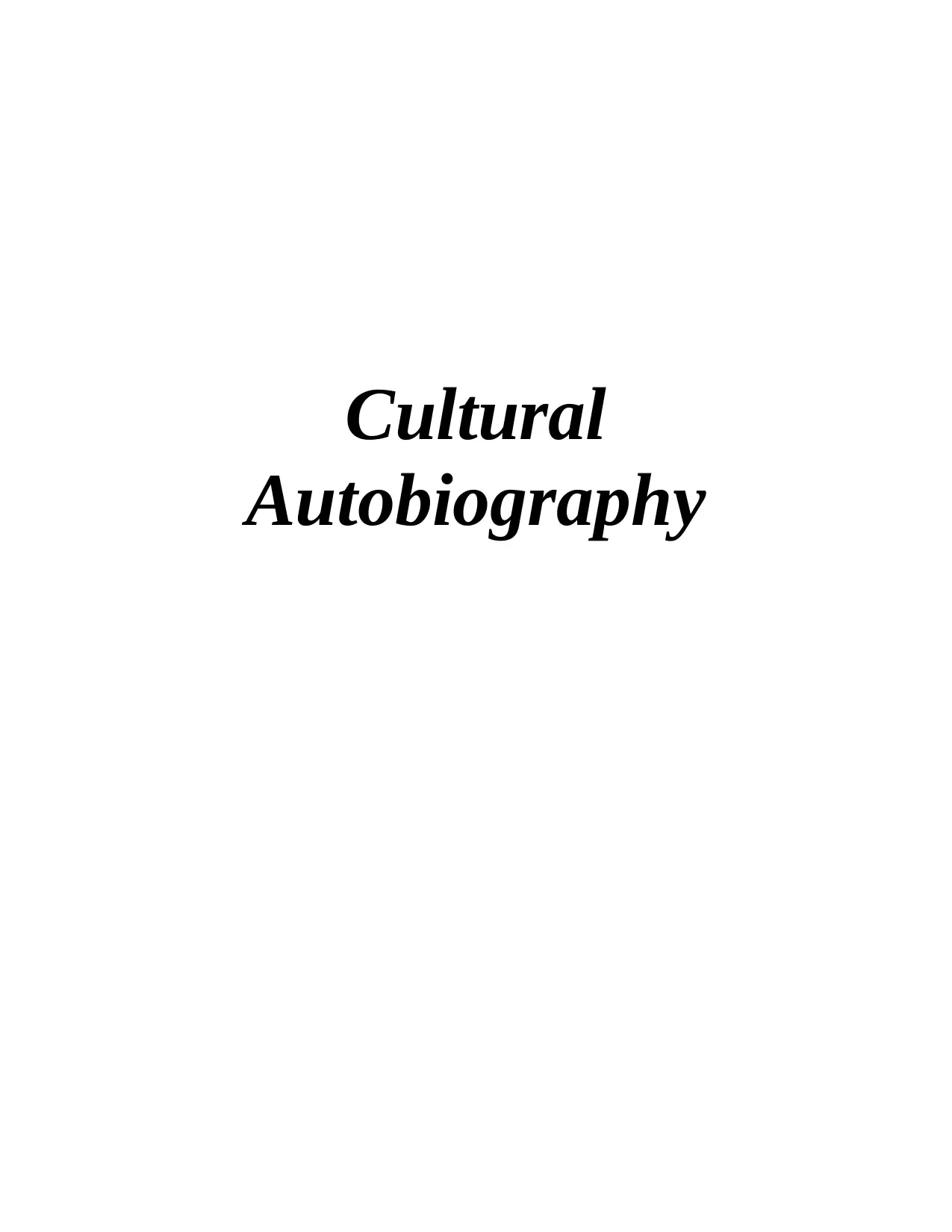
Cultural
Autobiography
Autobiography
Secure Best Marks with AI Grader
Need help grading? Try our AI Grader for instant feedback on your assignments.
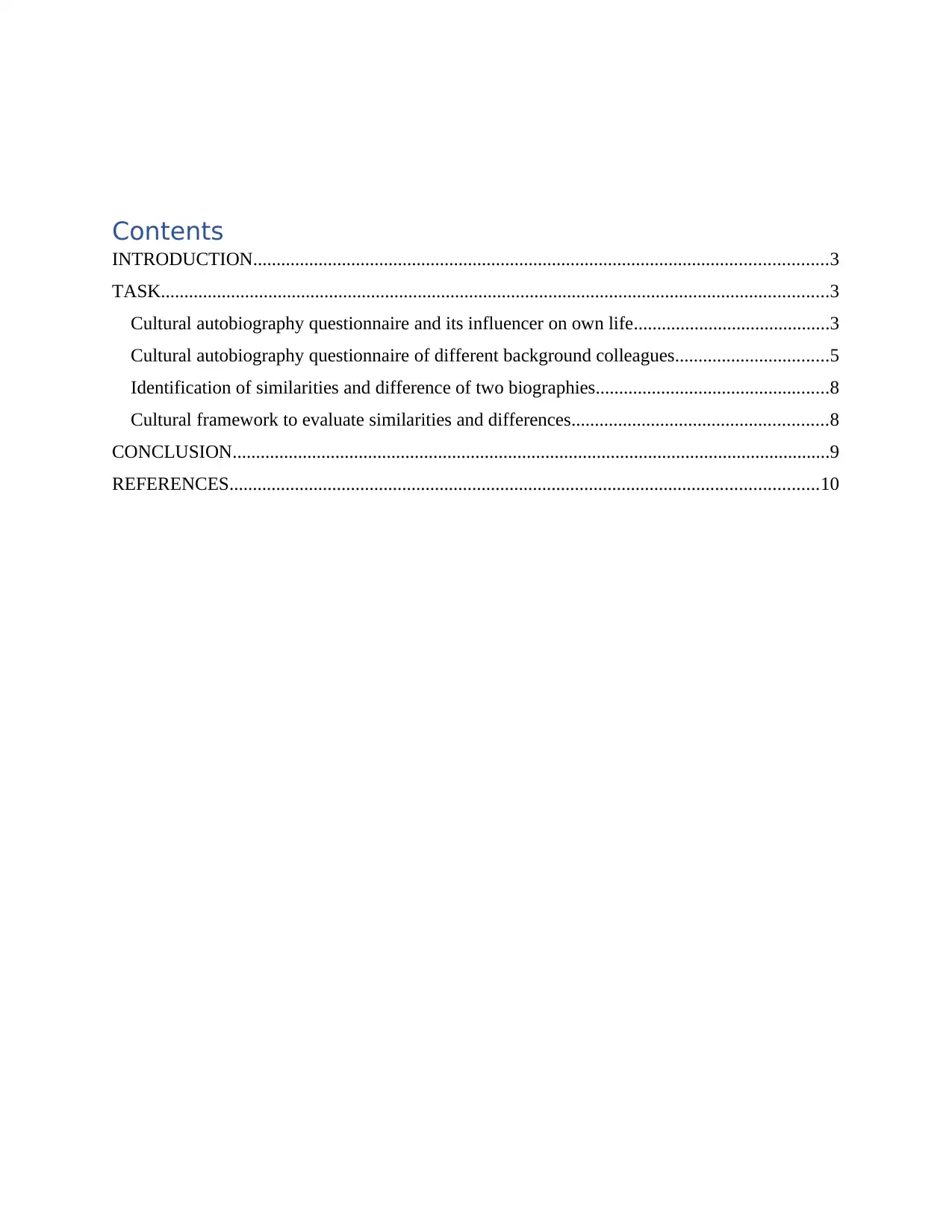
Contents
INTRODUCTION...........................................................................................................................3
TASK...............................................................................................................................................3
Cultural autobiography questionnaire and its influencer on own life..........................................3
Cultural autobiography questionnaire of different background colleagues.................................5
Identification of similarities and difference of two biographies..................................................8
Cultural framework to evaluate similarities and differences.......................................................8
CONCLUSION................................................................................................................................9
REFERENCES..............................................................................................................................10
INTRODUCTION...........................................................................................................................3
TASK...............................................................................................................................................3
Cultural autobiography questionnaire and its influencer on own life..........................................3
Cultural autobiography questionnaire of different background colleagues.................................5
Identification of similarities and difference of two biographies..................................................8
Cultural framework to evaluate similarities and differences.......................................................8
CONCLUSION................................................................................................................................9
REFERENCES..............................................................................................................................10
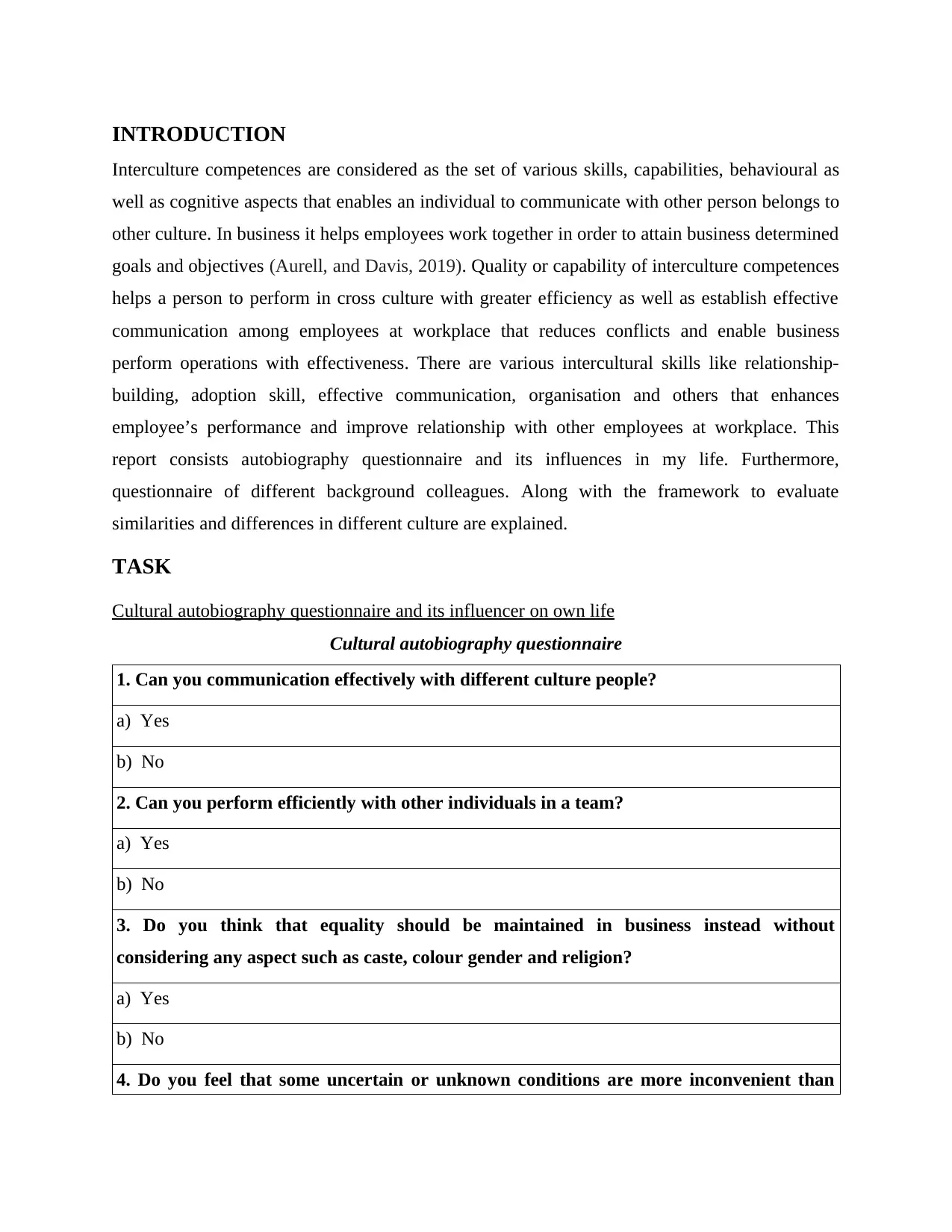
INTRODUCTION
Interculture competences are considered as the set of various skills, capabilities, behavioural as
well as cognitive aspects that enables an individual to communicate with other person belongs to
other culture. In business it helps employees work together in order to attain business determined
goals and objectives (Aurell, and Davis, 2019). Quality or capability of interculture competences
helps a person to perform in cross culture with greater efficiency as well as establish effective
communication among employees at workplace that reduces conflicts and enable business
perform operations with effectiveness. There are various intercultural skills like relationship-
building, adoption skill, effective communication, organisation and others that enhances
employee’s performance and improve relationship with other employees at workplace. This
report consists autobiography questionnaire and its influences in my life. Furthermore,
questionnaire of different background colleagues. Along with the framework to evaluate
similarities and differences in different culture are explained.
TASK
Cultural autobiography questionnaire and its influencer on own life
Cultural autobiography questionnaire
1. Can you communication effectively with different culture people?
a) Yes
b) No
2. Can you perform efficiently with other individuals in a team?
a) Yes
b) No
3. Do you think that equality should be maintained in business instead without
considering any aspect such as caste, colour gender and religion?
a) Yes
b) No
4. Do you feel that some uncertain or unknown conditions are more inconvenient than
Interculture competences are considered as the set of various skills, capabilities, behavioural as
well as cognitive aspects that enables an individual to communicate with other person belongs to
other culture. In business it helps employees work together in order to attain business determined
goals and objectives (Aurell, and Davis, 2019). Quality or capability of interculture competences
helps a person to perform in cross culture with greater efficiency as well as establish effective
communication among employees at workplace that reduces conflicts and enable business
perform operations with effectiveness. There are various intercultural skills like relationship-
building, adoption skill, effective communication, organisation and others that enhances
employee’s performance and improve relationship with other employees at workplace. This
report consists autobiography questionnaire and its influences in my life. Furthermore,
questionnaire of different background colleagues. Along with the framework to evaluate
similarities and differences in different culture are explained.
TASK
Cultural autobiography questionnaire and its influencer on own life
Cultural autobiography questionnaire
1. Can you communication effectively with different culture people?
a) Yes
b) No
2. Can you perform efficiently with other individuals in a team?
a) Yes
b) No
3. Do you think that equality should be maintained in business instead without
considering any aspect such as caste, colour gender and religion?
a) Yes
b) No
4. Do you feel that some uncertain or unknown conditions are more inconvenient than
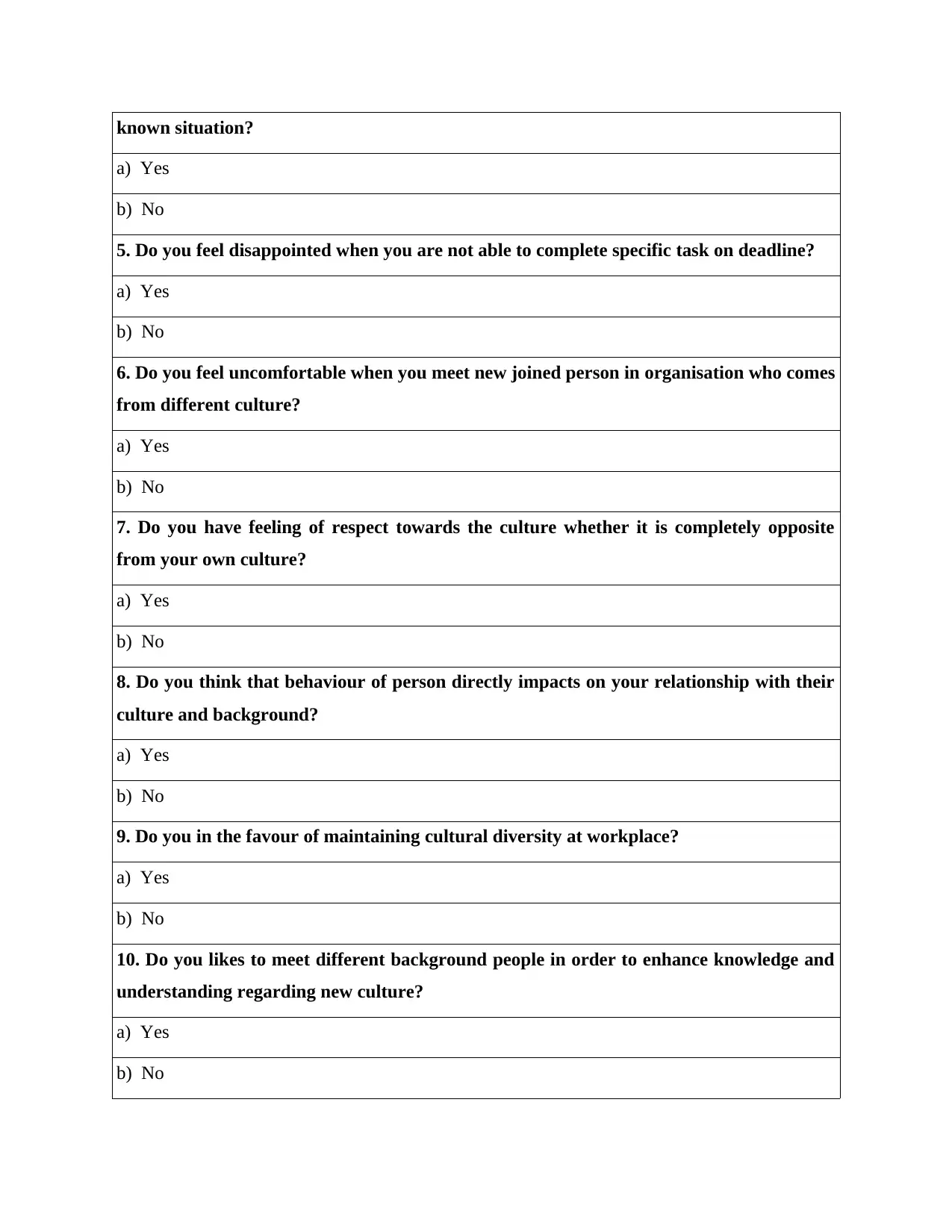
known situation?
a) Yes
b) No
5. Do you feel disappointed when you are not able to complete specific task on deadline?
a) Yes
b) No
6. Do you feel uncomfortable when you meet new joined person in organisation who comes
from different culture?
a) Yes
b) No
7. Do you have feeling of respect towards the culture whether it is completely opposite
from your own culture?
a) Yes
b) No
8. Do you think that behaviour of person directly impacts on your relationship with their
culture and background?
a) Yes
b) No
9. Do you in the favour of maintaining cultural diversity at workplace?
a) Yes
b) No
10. Do you likes to meet different background people in order to enhance knowledge and
understanding regarding new culture?
a) Yes
b) No
a) Yes
b) No
5. Do you feel disappointed when you are not able to complete specific task on deadline?
a) Yes
b) No
6. Do you feel uncomfortable when you meet new joined person in organisation who comes
from different culture?
a) Yes
b) No
7. Do you have feeling of respect towards the culture whether it is completely opposite
from your own culture?
a) Yes
b) No
8. Do you think that behaviour of person directly impacts on your relationship with their
culture and background?
a) Yes
b) No
9. Do you in the favour of maintaining cultural diversity at workplace?
a) Yes
b) No
10. Do you likes to meet different background people in order to enhance knowledge and
understanding regarding new culture?
a) Yes
b) No
Secure Best Marks with AI Grader
Need help grading? Try our AI Grader for instant feedback on your assignments.
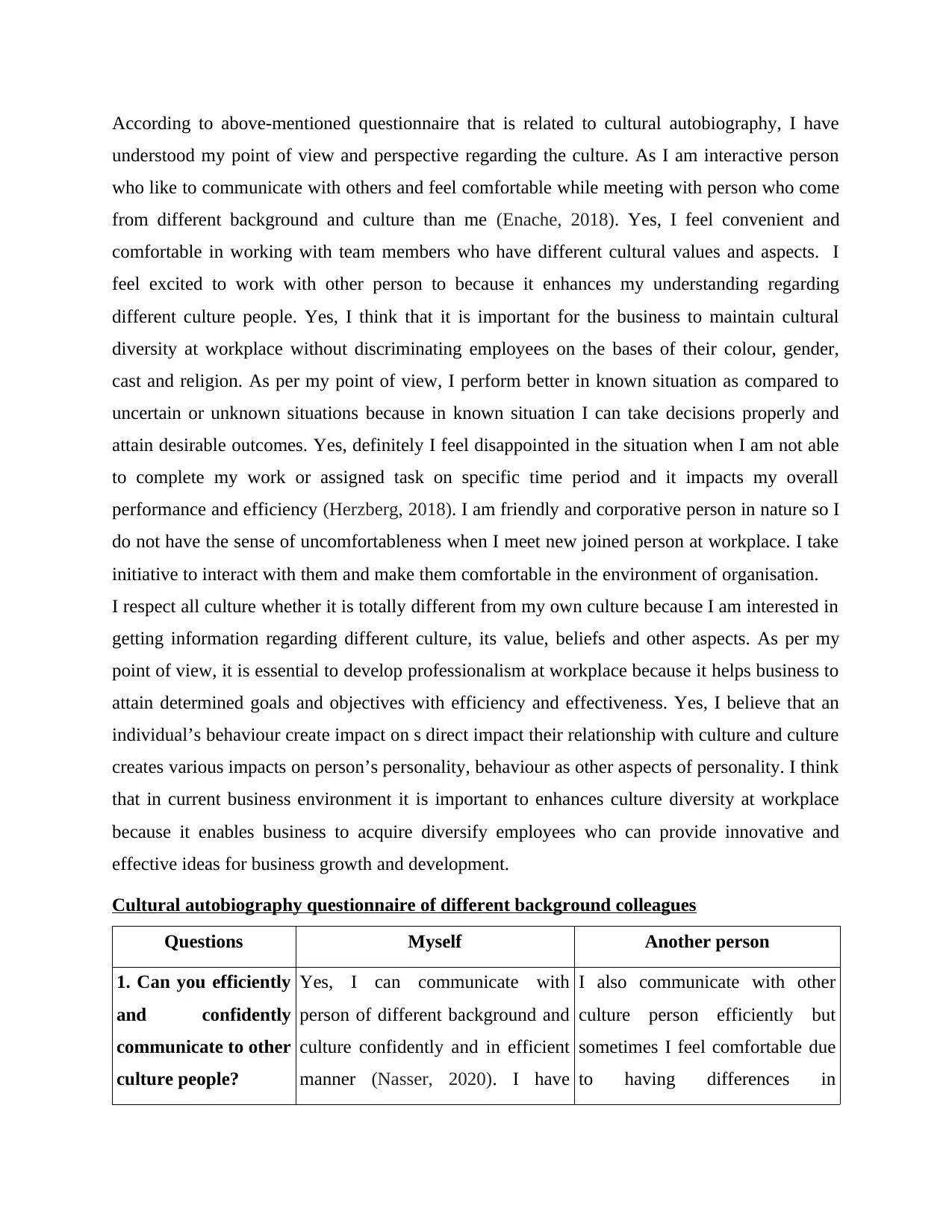
According to above-mentioned questionnaire that is related to cultural autobiography, I have
understood my point of view and perspective regarding the culture. As I am interactive person
who like to communicate with others and feel comfortable while meeting with person who come
from different background and culture than me (Enache, 2018). Yes, I feel convenient and
comfortable in working with team members who have different cultural values and aspects. I
feel excited to work with other person to because it enhances my understanding regarding
different culture people. Yes, I think that it is important for the business to maintain cultural
diversity at workplace without discriminating employees on the bases of their colour, gender,
cast and religion. As per my point of view, I perform better in known situation as compared to
uncertain or unknown situations because in known situation I can take decisions properly and
attain desirable outcomes. Yes, definitely I feel disappointed in the situation when I am not able
to complete my work or assigned task on specific time period and it impacts my overall
performance and efficiency (Herzberg, 2018). I am friendly and corporative person in nature so I
do not have the sense of uncomfortableness when I meet new joined person at workplace. I take
initiative to interact with them and make them comfortable in the environment of organisation.
I respect all culture whether it is totally different from my own culture because I am interested in
getting information regarding different culture, its value, beliefs and other aspects. As per my
point of view, it is essential to develop professionalism at workplace because it helps business to
attain determined goals and objectives with efficiency and effectiveness. Yes, I believe that an
individual’s behaviour create impact on s direct impact their relationship with culture and culture
creates various impacts on person’s personality, behaviour as other aspects of personality. I think
that in current business environment it is important to enhances culture diversity at workplace
because it enables business to acquire diversify employees who can provide innovative and
effective ideas for business growth and development.
Cultural autobiography questionnaire of different background colleagues
Questions Myself Another person
1. Can you efficiently
and confidently
communicate to other
culture people?
Yes, I can communicate with
person of different background and
culture confidently and in efficient
manner (Nasser, 2020). I have
I also communicate with other
culture person efficiently but
sometimes I feel comfortable due
to having differences in
understood my point of view and perspective regarding the culture. As I am interactive person
who like to communicate with others and feel comfortable while meeting with person who come
from different background and culture than me (Enache, 2018). Yes, I feel convenient and
comfortable in working with team members who have different cultural values and aspects. I
feel excited to work with other person to because it enhances my understanding regarding
different culture people. Yes, I think that it is important for the business to maintain cultural
diversity at workplace without discriminating employees on the bases of their colour, gender,
cast and religion. As per my point of view, I perform better in known situation as compared to
uncertain or unknown situations because in known situation I can take decisions properly and
attain desirable outcomes. Yes, definitely I feel disappointed in the situation when I am not able
to complete my work or assigned task on specific time period and it impacts my overall
performance and efficiency (Herzberg, 2018). I am friendly and corporative person in nature so I
do not have the sense of uncomfortableness when I meet new joined person at workplace. I take
initiative to interact with them and make them comfortable in the environment of organisation.
I respect all culture whether it is totally different from my own culture because I am interested in
getting information regarding different culture, its value, beliefs and other aspects. As per my
point of view, it is essential to develop professionalism at workplace because it helps business to
attain determined goals and objectives with efficiency and effectiveness. Yes, I believe that an
individual’s behaviour create impact on s direct impact their relationship with culture and culture
creates various impacts on person’s personality, behaviour as other aspects of personality. I think
that in current business environment it is important to enhances culture diversity at workplace
because it enables business to acquire diversify employees who can provide innovative and
effective ideas for business growth and development.
Cultural autobiography questionnaire of different background colleagues
Questions Myself Another person
1. Can you efficiently
and confidently
communicate to other
culture people?
Yes, I can communicate with
person of different background and
culture confidently and in efficient
manner (Nasser, 2020). I have
I also communicate with other
culture person efficiently but
sometimes I feel comfortable due
to having differences in
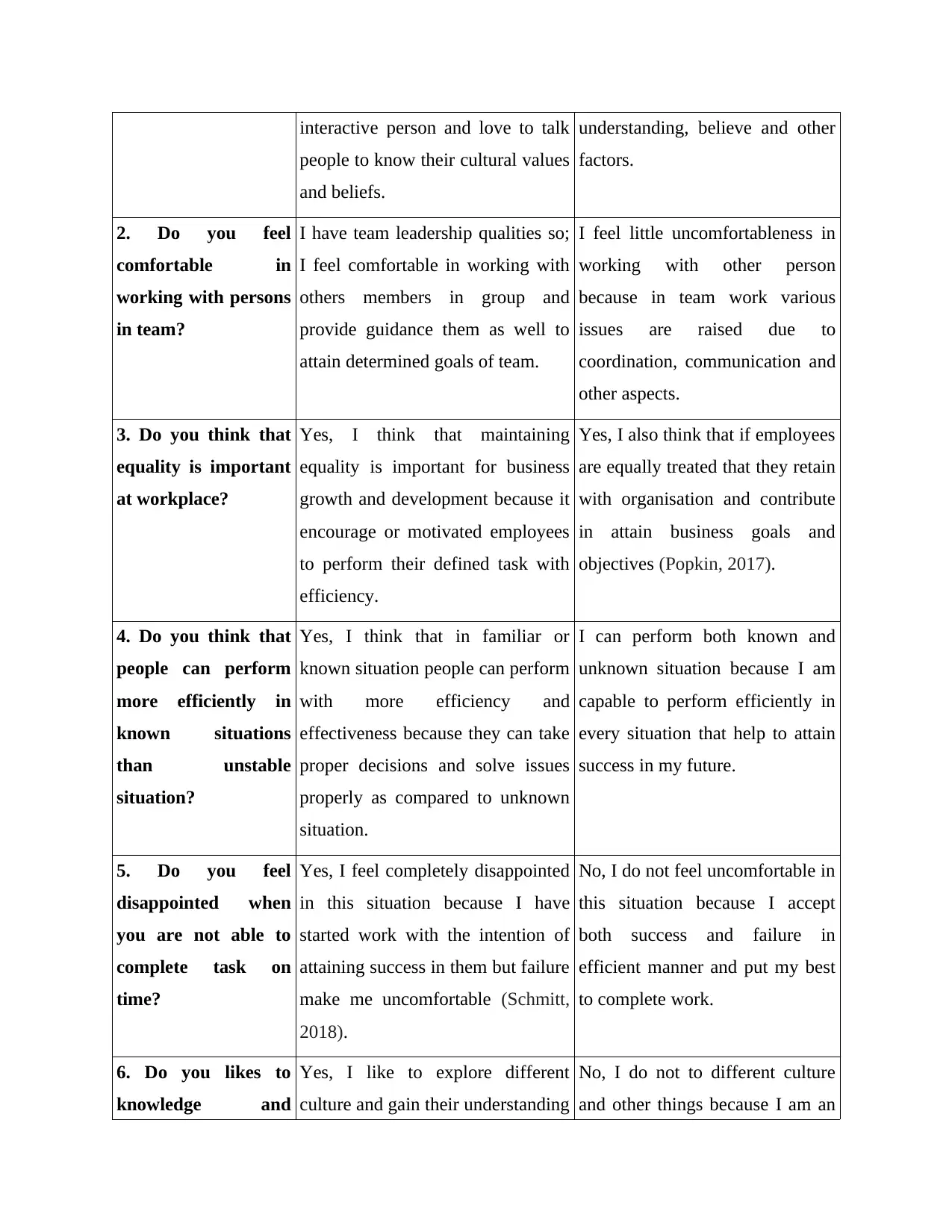
interactive person and love to talk
people to know their cultural values
and beliefs.
understanding, believe and other
factors.
2. Do you feel
comfortable in
working with persons
in team?
I have team leadership qualities so;
I feel comfortable in working with
others members in group and
provide guidance them as well to
attain determined goals of team.
I feel little uncomfortableness in
working with other person
because in team work various
issues are raised due to
coordination, communication and
other aspects.
3. Do you think that
equality is important
at workplace?
Yes, I think that maintaining
equality is important for business
growth and development because it
encourage or motivated employees
to perform their defined task with
efficiency.
Yes, I also think that if employees
are equally treated that they retain
with organisation and contribute
in attain business goals and
objectives (Popkin, 2017).
4. Do you think that
people can perform
more efficiently in
known situations
than unstable
situation?
Yes, I think that in familiar or
known situation people can perform
with more efficiency and
effectiveness because they can take
proper decisions and solve issues
properly as compared to unknown
situation.
I can perform both known and
unknown situation because I am
capable to perform efficiently in
every situation that help to attain
success in my future.
5. Do you feel
disappointed when
you are not able to
complete task on
time?
Yes, I feel completely disappointed
in this situation because I have
started work with the intention of
attaining success in them but failure
make me uncomfortable (Schmitt,
2018).
No, I do not feel uncomfortable in
this situation because I accept
both success and failure in
efficient manner and put my best
to complete work.
6. Do you likes to
knowledge and
Yes, I like to explore different
culture and gain their understanding
No, I do not to different culture
and other things because I am an
people to know their cultural values
and beliefs.
understanding, believe and other
factors.
2. Do you feel
comfortable in
working with persons
in team?
I have team leadership qualities so;
I feel comfortable in working with
others members in group and
provide guidance them as well to
attain determined goals of team.
I feel little uncomfortableness in
working with other person
because in team work various
issues are raised due to
coordination, communication and
other aspects.
3. Do you think that
equality is important
at workplace?
Yes, I think that maintaining
equality is important for business
growth and development because it
encourage or motivated employees
to perform their defined task with
efficiency.
Yes, I also think that if employees
are equally treated that they retain
with organisation and contribute
in attain business goals and
objectives (Popkin, 2017).
4. Do you think that
people can perform
more efficiently in
known situations
than unstable
situation?
Yes, I think that in familiar or
known situation people can perform
with more efficiency and
effectiveness because they can take
proper decisions and solve issues
properly as compared to unknown
situation.
I can perform both known and
unknown situation because I am
capable to perform efficiently in
every situation that help to attain
success in my future.
5. Do you feel
disappointed when
you are not able to
complete task on
time?
Yes, I feel completely disappointed
in this situation because I have
started work with the intention of
attaining success in them but failure
make me uncomfortable (Schmitt,
2018).
No, I do not feel uncomfortable in
this situation because I accept
both success and failure in
efficient manner and put my best
to complete work.
6. Do you likes to
knowledge and
Yes, I like to explore different
culture and gain their understanding
No, I do not to different culture
and other things because I am an
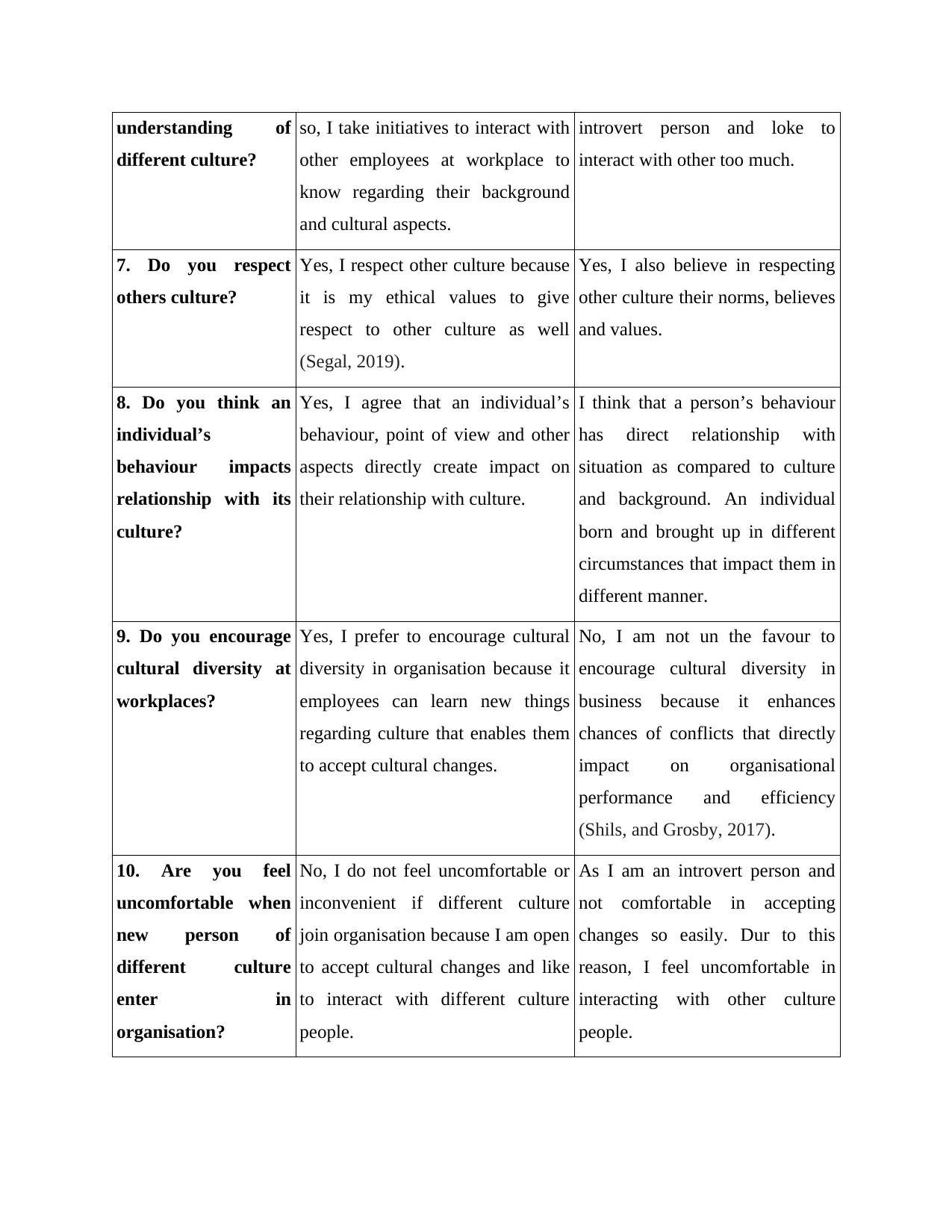
understanding of
different culture?
so, I take initiatives to interact with
other employees at workplace to
know regarding their background
and cultural aspects.
introvert person and loke to
interact with other too much.
7. Do you respect
others culture?
Yes, I respect other culture because
it is my ethical values to give
respect to other culture as well
(Segal, 2019).
Yes, I also believe in respecting
other culture their norms, believes
and values.
8. Do you think an
individual’s
behaviour impacts
relationship with its
culture?
Yes, I agree that an individual’s
behaviour, point of view and other
aspects directly create impact on
their relationship with culture.
I think that a person’s behaviour
has direct relationship with
situation as compared to culture
and background. An individual
born and brought up in different
circumstances that impact them in
different manner.
9. Do you encourage
cultural diversity at
workplaces?
Yes, I prefer to encourage cultural
diversity in organisation because it
employees can learn new things
regarding culture that enables them
to accept cultural changes.
No, I am not un the favour to
encourage cultural diversity in
business because it enhances
chances of conflicts that directly
impact on organisational
performance and efficiency
(Shils, and Grosby, 2017).
10. Are you feel
uncomfortable when
new person of
different culture
enter in
organisation?
No, I do not feel uncomfortable or
inconvenient if different culture
join organisation because I am open
to accept cultural changes and like
to interact with different culture
people.
As I am an introvert person and
not comfortable in accepting
changes so easily. Dur to this
reason, I feel uncomfortable in
interacting with other culture
people.
different culture?
so, I take initiatives to interact with
other employees at workplace to
know regarding their background
and cultural aspects.
introvert person and loke to
interact with other too much.
7. Do you respect
others culture?
Yes, I respect other culture because
it is my ethical values to give
respect to other culture as well
(Segal, 2019).
Yes, I also believe in respecting
other culture their norms, believes
and values.
8. Do you think an
individual’s
behaviour impacts
relationship with its
culture?
Yes, I agree that an individual’s
behaviour, point of view and other
aspects directly create impact on
their relationship with culture.
I think that a person’s behaviour
has direct relationship with
situation as compared to culture
and background. An individual
born and brought up in different
circumstances that impact them in
different manner.
9. Do you encourage
cultural diversity at
workplaces?
Yes, I prefer to encourage cultural
diversity in organisation because it
employees can learn new things
regarding culture that enables them
to accept cultural changes.
No, I am not un the favour to
encourage cultural diversity in
business because it enhances
chances of conflicts that directly
impact on organisational
performance and efficiency
(Shils, and Grosby, 2017).
10. Are you feel
uncomfortable when
new person of
different culture
enter in
organisation?
No, I do not feel uncomfortable or
inconvenient if different culture
join organisation because I am open
to accept cultural changes and like
to interact with different culture
people.
As I am an introvert person and
not comfortable in accepting
changes so easily. Dur to this
reason, I feel uncomfortable in
interacting with other culture
people.
Paraphrase This Document
Need a fresh take? Get an instant paraphrase of this document with our AI Paraphraser
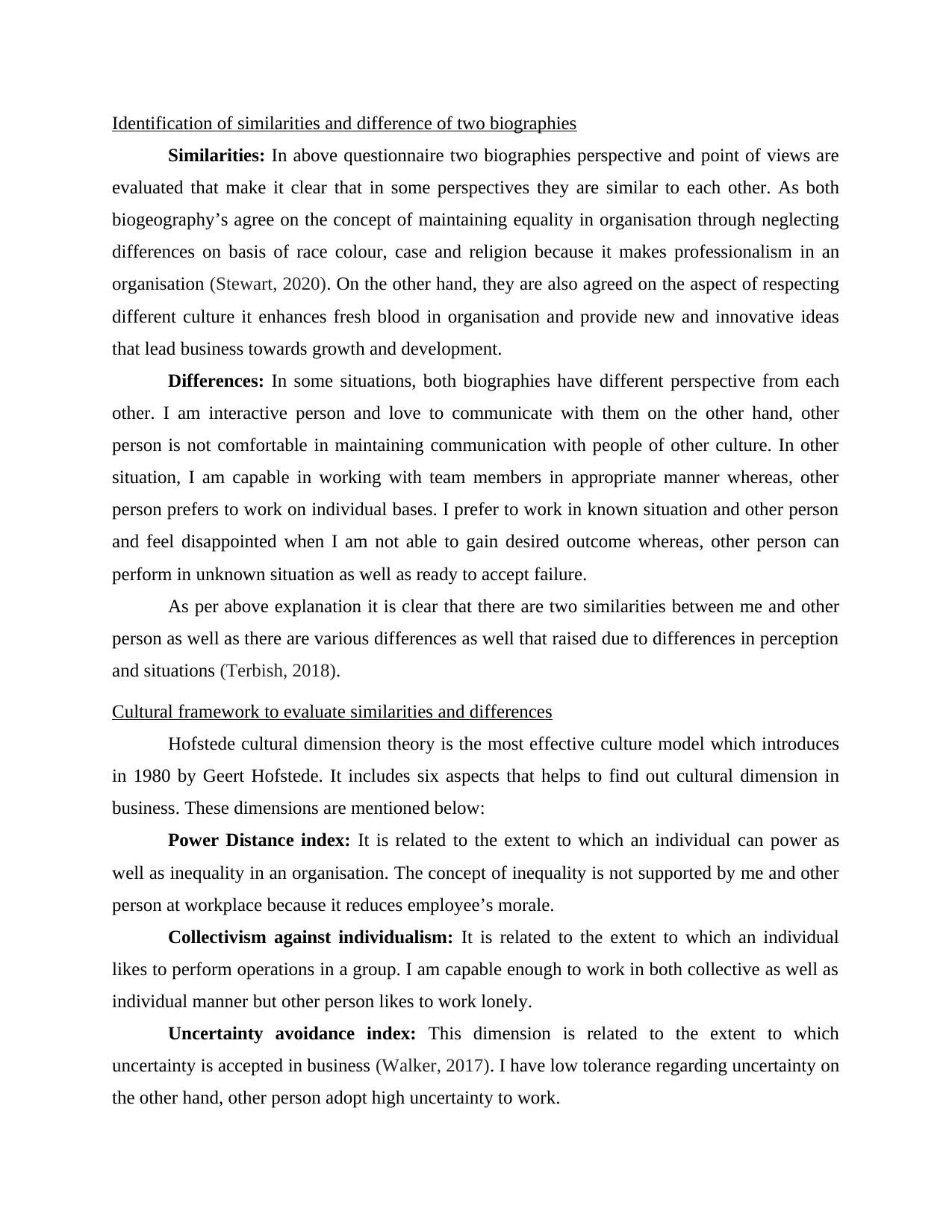
Identification of similarities and difference of two biographies
Similarities: In above questionnaire two biographies perspective and point of views are
evaluated that make it clear that in some perspectives they are similar to each other. As both
biogeography’s agree on the concept of maintaining equality in organisation through neglecting
differences on basis of race colour, case and religion because it makes professionalism in an
organisation (Stewart, 2020). On the other hand, they are also agreed on the aspect of respecting
different culture it enhances fresh blood in organisation and provide new and innovative ideas
that lead business towards growth and development.
Differences: In some situations, both biographies have different perspective from each
other. I am interactive person and love to communicate with them on the other hand, other
person is not comfortable in maintaining communication with people of other culture. In other
situation, I am capable in working with team members in appropriate manner whereas, other
person prefers to work on individual bases. I prefer to work in known situation and other person
and feel disappointed when I am not able to gain desired outcome whereas, other person can
perform in unknown situation as well as ready to accept failure.
As per above explanation it is clear that there are two similarities between me and other
person as well as there are various differences as well that raised due to differences in perception
and situations (Terbish, 2018).
Cultural framework to evaluate similarities and differences
Hofstede cultural dimension theory is the most effective culture model which introduces
in 1980 by Geert Hofstede. It includes six aspects that helps to find out cultural dimension in
business. These dimensions are mentioned below:
Power Distance index: It is related to the extent to which an individual can power as
well as inequality in an organisation. The concept of inequality is not supported by me and other
person at workplace because it reduces employee’s morale.
Collectivism against individualism: It is related to the extent to which an individual
likes to perform operations in a group. I am capable enough to work in both collective as well as
individual manner but other person likes to work lonely.
Uncertainty avoidance index: This dimension is related to the extent to which
uncertainty is accepted in business (Walker, 2017). I have low tolerance regarding uncertainty on
the other hand, other person adopt high uncertainty to work.
Similarities: In above questionnaire two biographies perspective and point of views are
evaluated that make it clear that in some perspectives they are similar to each other. As both
biogeography’s agree on the concept of maintaining equality in organisation through neglecting
differences on basis of race colour, case and religion because it makes professionalism in an
organisation (Stewart, 2020). On the other hand, they are also agreed on the aspect of respecting
different culture it enhances fresh blood in organisation and provide new and innovative ideas
that lead business towards growth and development.
Differences: In some situations, both biographies have different perspective from each
other. I am interactive person and love to communicate with them on the other hand, other
person is not comfortable in maintaining communication with people of other culture. In other
situation, I am capable in working with team members in appropriate manner whereas, other
person prefers to work on individual bases. I prefer to work in known situation and other person
and feel disappointed when I am not able to gain desired outcome whereas, other person can
perform in unknown situation as well as ready to accept failure.
As per above explanation it is clear that there are two similarities between me and other
person as well as there are various differences as well that raised due to differences in perception
and situations (Terbish, 2018).
Cultural framework to evaluate similarities and differences
Hofstede cultural dimension theory is the most effective culture model which introduces
in 1980 by Geert Hofstede. It includes six aspects that helps to find out cultural dimension in
business. These dimensions are mentioned below:
Power Distance index: It is related to the extent to which an individual can power as
well as inequality in an organisation. The concept of inequality is not supported by me and other
person at workplace because it reduces employee’s morale.
Collectivism against individualism: It is related to the extent to which an individual
likes to perform operations in a group. I am capable enough to work in both collective as well as
individual manner but other person likes to work lonely.
Uncertainty avoidance index: This dimension is related to the extent to which
uncertainty is accepted in business (Walker, 2017). I have low tolerance regarding uncertainty on
the other hand, other person adopt high uncertainty to work.
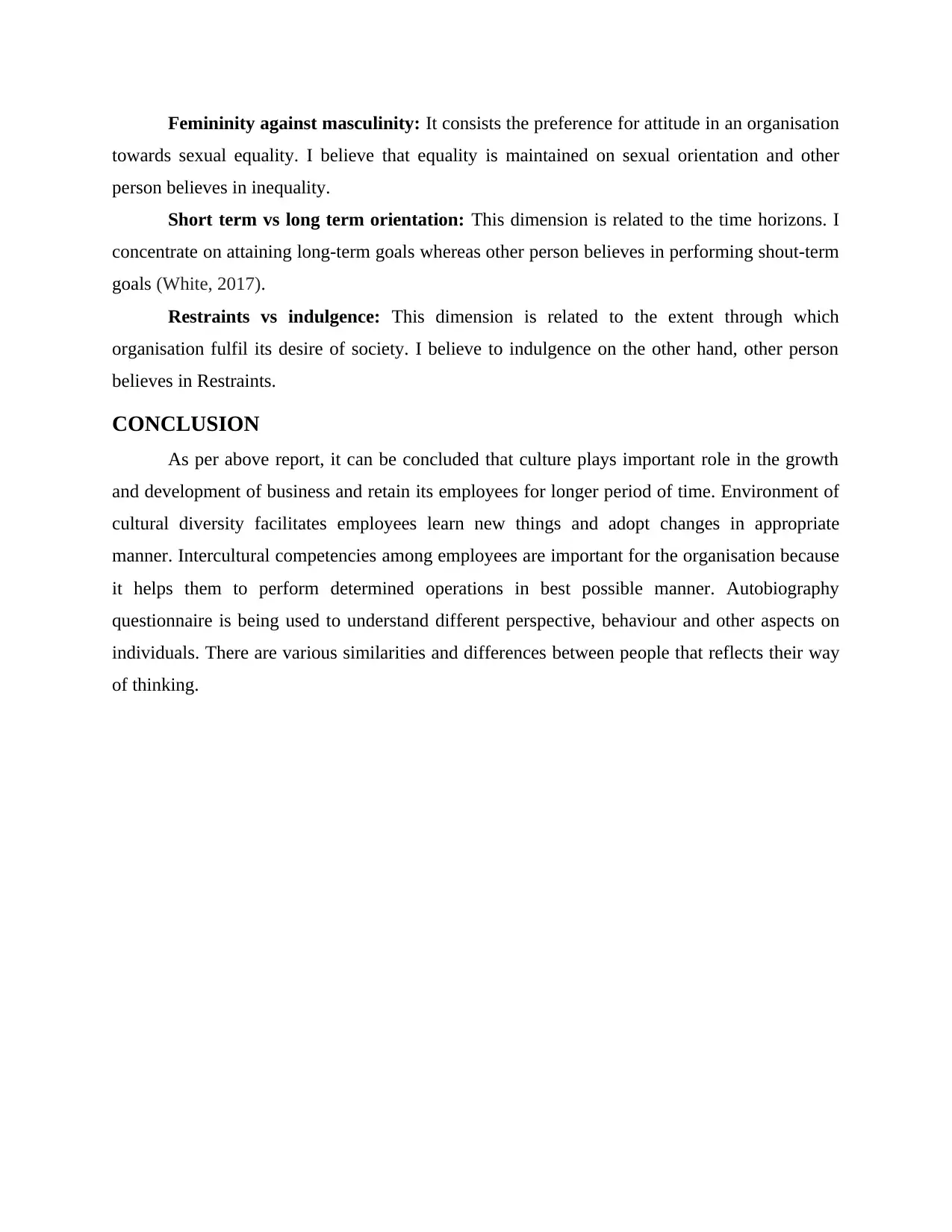
Femininity against masculinity: It consists the preference for attitude in an organisation
towards sexual equality. I believe that equality is maintained on sexual orientation and other
person believes in inequality.
Short term vs long term orientation: This dimension is related to the time horizons. I
concentrate on attaining long-term goals whereas other person believes in performing shout-term
goals (White, 2017).
Restraints vs indulgence: This dimension is related to the extent through which
organisation fulfil its desire of society. I believe to indulgence on the other hand, other person
believes in Restraints.
CONCLUSION
As per above report, it can be concluded that culture plays important role in the growth
and development of business and retain its employees for longer period of time. Environment of
cultural diversity facilitates employees learn new things and adopt changes in appropriate
manner. Intercultural competencies among employees are important for the organisation because
it helps them to perform determined operations in best possible manner. Autobiography
questionnaire is being used to understand different perspective, behaviour and other aspects on
individuals. There are various similarities and differences between people that reflects their way
of thinking.
towards sexual equality. I believe that equality is maintained on sexual orientation and other
person believes in inequality.
Short term vs long term orientation: This dimension is related to the time horizons. I
concentrate on attaining long-term goals whereas other person believes in performing shout-term
goals (White, 2017).
Restraints vs indulgence: This dimension is related to the extent through which
organisation fulfil its desire of society. I believe to indulgence on the other hand, other person
believes in Restraints.
CONCLUSION
As per above report, it can be concluded that culture plays important role in the growth
and development of business and retain its employees for longer period of time. Environment of
cultural diversity facilitates employees learn new things and adopt changes in appropriate
manner. Intercultural competencies among employees are important for the organisation because
it helps them to perform determined operations in best possible manner. Autobiography
questionnaire is being used to understand different perspective, behaviour and other aspects on
individuals. There are various similarities and differences between people that reflects their way
of thinking.
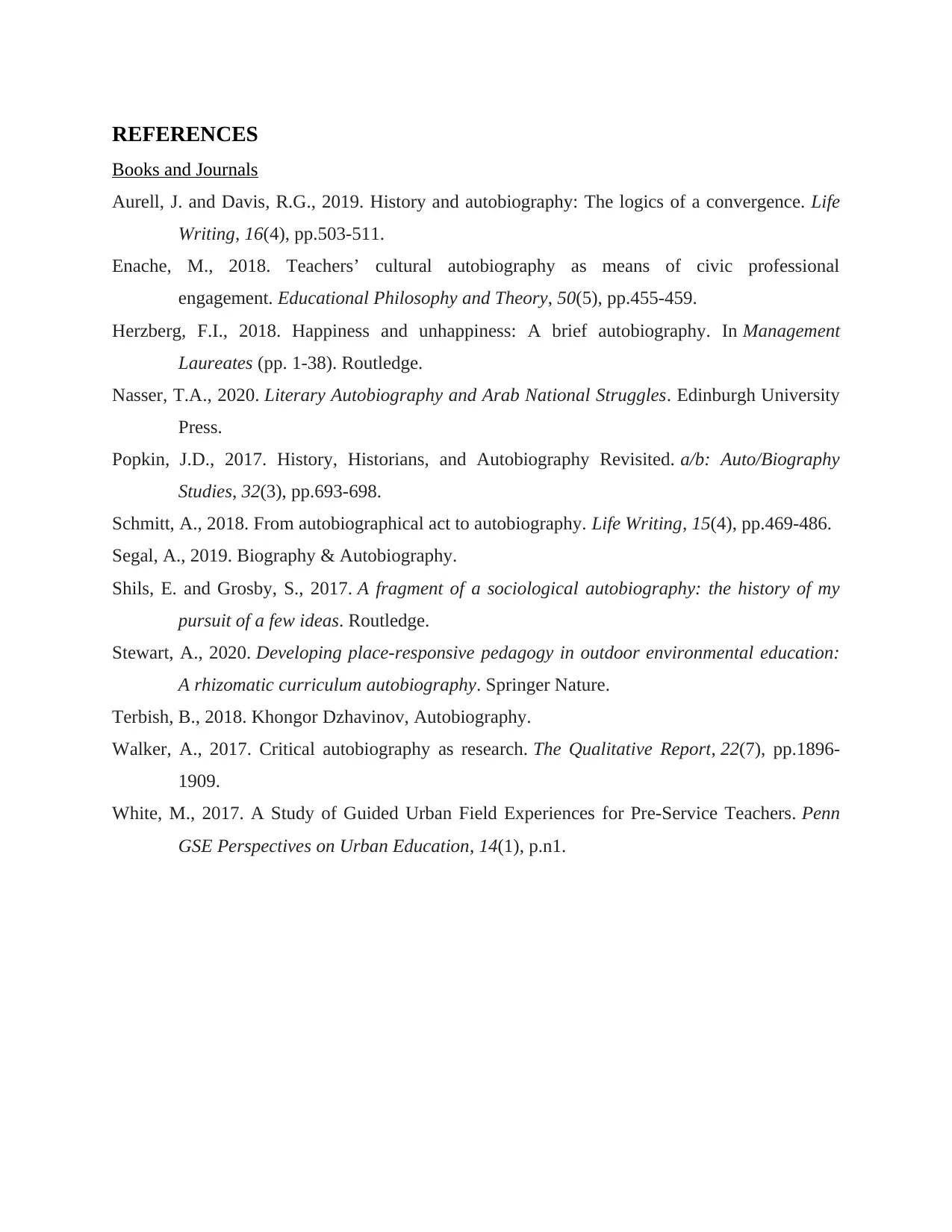
REFERENCES
Books and Journals
Aurell, J. and Davis, R.G., 2019. History and autobiography: The logics of a convergence. Life
Writing, 16(4), pp.503-511.
Enache, M., 2018. Teachers’ cultural autobiography as means of civic professional
engagement. Educational Philosophy and Theory, 50(5), pp.455-459.
Herzberg, F.I., 2018. Happiness and unhappiness: A brief autobiography. In Management
Laureates (pp. 1-38). Routledge.
Nasser, T.A., 2020. Literary Autobiography and Arab National Struggles. Edinburgh University
Press.
Popkin, J.D., 2017. History, Historians, and Autobiography Revisited. a/b: Auto/Biography
Studies, 32(3), pp.693-698.
Schmitt, A., 2018. From autobiographical act to autobiography. Life Writing, 15(4), pp.469-486.
Segal, A., 2019. Biography & Autobiography.
Shils, E. and Grosby, S., 2017. A fragment of a sociological autobiography: the history of my
pursuit of a few ideas. Routledge.
Stewart, A., 2020. Developing place-responsive pedagogy in outdoor environmental education:
A rhizomatic curriculum autobiography. Springer Nature.
Terbish, B., 2018. Khongor Dzhavinov, Autobiography.
Walker, A., 2017. Critical autobiography as research. The Qualitative Report, 22(7), pp.1896-
1909.
White, M., 2017. A Study of Guided Urban Field Experiences for Pre-Service Teachers. Penn
GSE Perspectives on Urban Education, 14(1), p.n1.
Books and Journals
Aurell, J. and Davis, R.G., 2019. History and autobiography: The logics of a convergence. Life
Writing, 16(4), pp.503-511.
Enache, M., 2018. Teachers’ cultural autobiography as means of civic professional
engagement. Educational Philosophy and Theory, 50(5), pp.455-459.
Herzberg, F.I., 2018. Happiness and unhappiness: A brief autobiography. In Management
Laureates (pp. 1-38). Routledge.
Nasser, T.A., 2020. Literary Autobiography and Arab National Struggles. Edinburgh University
Press.
Popkin, J.D., 2017. History, Historians, and Autobiography Revisited. a/b: Auto/Biography
Studies, 32(3), pp.693-698.
Schmitt, A., 2018. From autobiographical act to autobiography. Life Writing, 15(4), pp.469-486.
Segal, A., 2019. Biography & Autobiography.
Shils, E. and Grosby, S., 2017. A fragment of a sociological autobiography: the history of my
pursuit of a few ideas. Routledge.
Stewart, A., 2020. Developing place-responsive pedagogy in outdoor environmental education:
A rhizomatic curriculum autobiography. Springer Nature.
Terbish, B., 2018. Khongor Dzhavinov, Autobiography.
Walker, A., 2017. Critical autobiography as research. The Qualitative Report, 22(7), pp.1896-
1909.
White, M., 2017. A Study of Guided Urban Field Experiences for Pre-Service Teachers. Penn
GSE Perspectives on Urban Education, 14(1), p.n1.
Secure Best Marks with AI Grader
Need help grading? Try our AI Grader for instant feedback on your assignments.

1 out of 11
Related Documents
Your All-in-One AI-Powered Toolkit for Academic Success.
+13062052269
info@desklib.com
Available 24*7 on WhatsApp / Email
![[object Object]](/_next/static/media/star-bottom.7253800d.svg)
Unlock your academic potential
© 2024 | Zucol Services PVT LTD | All rights reserved.



